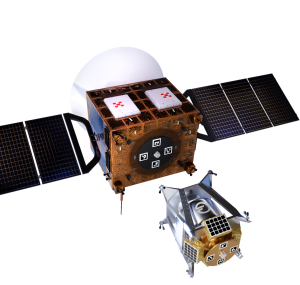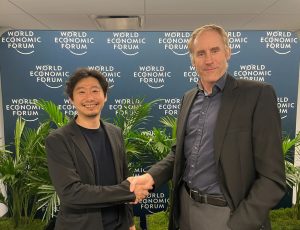The companies have signed a memorandum of understanding (MoU) to co-operate on creating new methods for using fuel in outer space. For example, they aim to use resources such as water, ice, lunar regolith, and other mineral resources on the lunar surface.
They also plan projects involving lunar resource mapping and ISRU (In-Situ Resource Utilisation) missions, aimed at significantly reducing dependence on Earth for fuel supplies.
Further in the future, the companies say they plan to have Orbit Fab refuel iSpace’s lander as it travels through space. This will, they say, enable long-term experiments in cislunar space, and improve efficiencies in transporting payloads and satellites.
Orbit Fab
Orbit Fab is already installing its refuelling port Rapidly Attachable Fluid Transfer Interface (RAFTI) for a range of governmental and commercial customers. In the future, it hopes to provide fuel for spacecraft, such as satellites and lunar landers.
Earlier this month, for example, the UK government announced Enabling Technologies Programme (ETP) funding for a range of projects to help boost UK development of new space technologies. One of these involved Orbit Fab – it was awarded £228,000 for the development of its in-orbit refuelling interface.
Founded in 2018, the company is based in Lafayette, Colorado, and has a UK Subsidiary on the Harwell Campus in Oxfordshire.
iSpace
Headquartered in Japan, iSpace is currently leading the development of Mission 2, which is scheduled to launch in the winter of 2024. Its US subsidiary is leading the development of Mission 3, which is scheduled to launch in 2026 using its Series 2 lander.
In December 2022, it launched its Series 1 lunar lander, the HAKUTO-R M1 (pictured), with the stated aim of making the Earth and the Moon “a unified ecosystem”.
Supply chain
“Creating a supply chain that utilizes space resources on the moon and in orbit is in line with ispace’s vision of ‘Expand our planet. Expand our future’,” said ispace CEO and founder, Takefumi Hakamada, on signing the MoU.
“This is essential for achieving this goal, and we are pleased to be able to work with Orbit Fab as a step toward that goal.The accumulation of our efforts will be a positive step toward long-term lunar surface development and the creation of a cislunar economic zone. I am confident that we will be connected.”
For its part, Orbit Fab founder and CEO, Daniel Faber, added:
“The signing of this memorandum with ispace will greatly contribute to the realization of a sustainable and vibrant lunar economy. We are focused on extending the operational life of critical missions by resupplying and making satellites and other spacecraft reusable for years in space.”
Image: iSpace. Pictured above are ispace CEO and founder, Takefumi Hakamada, and Orbit Fab founder and CEO, Daniel Faber.
See also: ispace goes public to boost lunar transportation services


